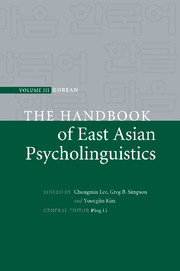Book contents
- Frontmatter
- Contents
- List of figures
- List of tables
- List of contributors
- Preface
- Introduction: Advances in Korean psycholinguistics
- Part I Language acquisition
- Part II Language processing
- 28 Visual processing of Hangul, the Korean script
- 29 English vowel spaces produced and perceived by Americans and Koreans
- 30 Morphological representation and processing of Sino-Korean words
- 31 The role of phonology in word recognition of Korean Hangul and Hanja
- 32 Lexical and sublexical processes in Korean word recognition
- 33 Prosody in sentence processing
- 34 Korean sentence processing
- 35 Sentence processing and memory representation in Korean
- 36 Understanding complex sentences: memory constraints and informational structure
- 37 ERP studies of Korean language processing: word-order effects
- 38 Inferences during discourse comprehension in Korean
- 39 Morpho-syntactic processing in Korean aphasics
- 40 Morpho-syntactic processing of Korean-speaking adults with Broca's aphasia
- 41 Comprehension deficits in Korean agrammatic aphasia
- 42 Developmental reading disorders in Korean
- 43 Individual differences in Korean language processing: context-dependent processing of skilled readers in word ambiguity resolution
- 44 A computational model of lexical and morphological processing in Korean
- References
- Name index
- Subject index
34 - Korean sentence processing
from Part II - Language processing
Published online by Cambridge University Press: 05 June 2012
- Frontmatter
- Contents
- List of figures
- List of tables
- List of contributors
- Preface
- Introduction: Advances in Korean psycholinguistics
- Part I Language acquisition
- Part II Language processing
- 28 Visual processing of Hangul, the Korean script
- 29 English vowel spaces produced and perceived by Americans and Koreans
- 30 Morphological representation and processing of Sino-Korean words
- 31 The role of phonology in word recognition of Korean Hangul and Hanja
- 32 Lexical and sublexical processes in Korean word recognition
- 33 Prosody in sentence processing
- 34 Korean sentence processing
- 35 Sentence processing and memory representation in Korean
- 36 Understanding complex sentences: memory constraints and informational structure
- 37 ERP studies of Korean language processing: word-order effects
- 38 Inferences during discourse comprehension in Korean
- 39 Morpho-syntactic processing in Korean aphasics
- 40 Morpho-syntactic processing of Korean-speaking adults with Broca's aphasia
- 41 Comprehension deficits in Korean agrammatic aphasia
- 42 Developmental reading disorders in Korean
- 43 Individual differences in Korean language processing: context-dependent processing of skilled readers in word ambiguity resolution
- 44 A computational model of lexical and morphological processing in Korean
- References
- Name index
- Subject index
Summary
One of the most important issues in the study of language processing concerns the universality of sentence processing strategies across different languages (e.g. Hillert, 1998; de Vincenzi, 2000). As all researchers agree, if the goal of psycholinguistics is to study the human sentence processor and not the sentence processing mechanisms of a specific language, the test of universality is not an option but a necessary condition for evaluating various models of sentence processing.
Crosslinguistic comparisons of sentence processing can be attempted from two different perspectives. One is the universality hypothesis. It argues that there are universal processing strategies that apply to all languages, because processing strategies are independent of specific languages and are based on cognitive universals. The strategies or principles that could be considered as being universal are minimal attachment and late closure (Frazier, 1987;) as well as the minimal chain principle (de Vincenzi, 1991). These principles are assumed to operate in all languages, with only the ‘vocabulary,’ i.e. lexical items and specific grammar, differing across languages.
Another reason to do crosslinguistic studies might be the expectation that different languages show different processing strategies, under an assumption that parsing strategies are a reflection of language-specific characteristics and a by-product of exposure to a given language. Some processing strategies may not be universal but are instead language specific or parameterized (e.g. Mazuka, 1998). So, there is no need, at least in principle, to test the same strategy in different languages.
- Type
- Chapter
- Information
- The Handbook of East Asian Psycholinguistics , pp. 433 - 441Publisher: Cambridge University PressPrint publication year: 2009
- 1
- Cited by



